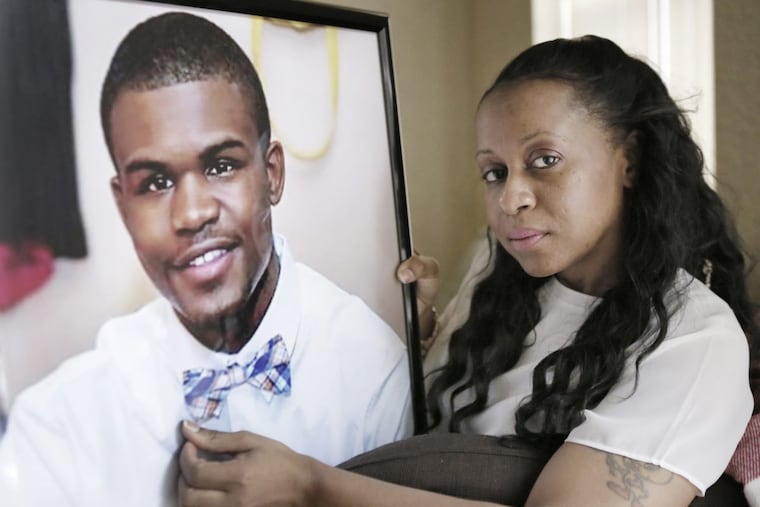'We're killing each other' | Helen Ubiñas
"We scream, 'The cops are killing us, the cops are killing us,' but we never scream, 'We're killing each other.'

Two days into the new year, Felicia Pendleton finally received something that, from the outside anyway, resembled a small measure of justice after the murder of her son.
She'd promised not to spend any more time than she had to in the same courtroom as two men accused of gunning down her 20–year-old son, Jayvon Mitchell Pendleton, in 2016.
So she planned to wait out jury selection inside the lobby of a nearby hotel. She'd just arrived at the Philadelphia Marriott, across the street from the Criminal Justice Center, when her phone rang.
It was the assistant district attorney handling her son's case. She needed to hurry to Courtroom 507.
The older of the two defendants, Khalil Davenport, was pleading guilty. The 22-year-old would be sentenced in March, after the trial of the second man, who was all of 15 at the time of the shooting.
The next day, Nasir McNamee also pleaded guilty. The judge sentenced him to 20 to 40 years in prison.
The benches inside the courtroom were filled with family and friends of all three young men, people whose lives still intersected daily. That's how it is in Philly. They lived blocks from one another. They used the same supermarket, the same laundromat. Pendleton went to school with McNamee's mother and aunt.
Pendleton decided to address the teenager directly.
She walked slowly toward the front of the courtroom.
Her son had a plan, she told McNamee, sitting with his lawyer at the defense table. Graduate from Cheyney University. Marry his girlfriend. Maybe take a good, steady job at the Water Department now that he had just passed the civil service exam.
She had plans, too, she went on — to go to her son's college graduation, to walk down the aisle at his wedding, to fuss over her first grandchild. None of those plans ever included preparing for the trials of the men who'd admitted killing her firstborn and all of her plans with him.
She then turned her attention to the other young men in the courtroom sitting uncomfortably on their benches, faces defiant, and implored them to do better, to be better, and learn from the fate McNamee now faced.
"Don't let this be your life."
Pendleton's mother spoke next. It was her birthday, a day her grandson Jayvon never forgot.
And then Pendleton's sister, Tanja Irby, spoke.
"I feel sorry for you," she told McNamee.
And then she directed her remarks to everyone else.
"This wasn't the only murder that day," Irby said. "We scream, 'The cops are killing us, the cops are killing us,' but we never scream, 'We're killing each other.' "
McNamee eked out an apology. "I am sorry," he said. "I apologize."
On her way out of the courtroom, his aunt stopped at the end of the bench where Pendleton was sitting.
"I'm truly sorry," she said. "I know it's not enough, but I am truly sorry."
And then, it was over.
All the preparation, the stress of having to brace herself for details of her son's last moments on March 2, when one minute he was walking on the sidewalk in Strawberry Mansion with a friend and the next he was fighting for his life, having been shot three times, once in the back of the head. … She didn't have to go through any of it.
Maybe that's why Pendleton was so wired, why the anger and sadness and sting of tears threatened to boil over, even as she realized that imperfect as the resolution had been, she had at least gotten something many mothers of murdered children don't get when their homicides go unsolved.
The first time I met Pendleton, she was testifying before City Council's Committee on Public Safety during a hearing on gun violence just a few weeks after her son's death.
She was there to talk about her son. But she was also there to talk about the sons who end up behind the guns, and then behind bars.
"A lot of these kids are out here fending for themselves," she told council members that day. "They need help right now. Today."
There were 277 homicides that year. Last year, 317 people in Philly were murdered, the first time the city surpassed 300 homicides since 2012.
"Nothing's changed," she said.
The next morning, she turned to Facebook to thank everyone for their support. It had been another sleepless night, another in nearly two years of sleepless nights where she'd find herself on the couch, waiting for Jayvon to come home, where if she was just still enough, she could hear his voice, feel his presence.
That night she was up, watching videos of him and wondering what his life would look like now.
Other mothers whose children had been murdered talk of closure, of justice, of perhaps peace.
Pendleton spoke of a small sense of relief. Those boys won't be able to take anyone else's child from them.
And she spoke of suffering, the emotion she knows best.